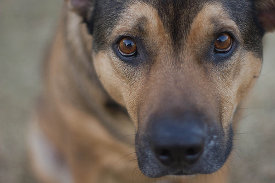|
 Parvovirus is a viral infection that spreads easily, acts quickly, and needs immediate medical attention. How do dogs get parvo, how do you know if your dog has it, and what should you do? Parvovirus is a viral infection that spreads easily, acts quickly, and needs immediate medical attention. How do dogs get parvo, how do you know if your dog has it, and what should you do?
What Is Parvo?
Parvo is a virus that quickly causes severe reactions in dogs. It acts by attacking the body’s cells, including white blood cells. This means it kills the white blood cells that are the body’s natural army against infection. Unlike some other illnesses which the body can fight, parvo leaves the body virtually defenseless. If not treated soon enough, it can be fatal.
How Do Dogs Get Parvo?
Parvo spreads virally. Anything an infected dog has been in contact with is a potential transmitter of the disease. The virus lives for a long time and is resistant to changes in environment, making it a disease that spreads easily. Dogs can pick up parvo by touching anything a dog with parvo has left feces on – dirt, flooring, the street, etc.
What Symptoms Does A Dog With Parvo Show?
Dogs with parvo typically become lethargic, vomit, lose their appetite, and have severe, bloody diarrhea. Together, these symptoms leave a dog extremely dehydrated, which makes the dog even weaker.
How Is Parvo Prevented?
Parvo is easily prevented by vaccines. It’s typically given as part of routine puppy vaccines and adult booster vaccines for continued immunity. When your dog goes in for a rabies vaccine, your veterinarian will often recommend a combination vaccine with it, sometimes called a 5-in-1, DHPP, or a similar acronym. Depending on the combination your vet recommends, it will protect against parvo plus other canine illnesses including distemper, hepatitis, parainfluenza, and adenovirus. Consult your vet about what vaccines make sense for your dog.
What Should You Do If Your Dog Has Parvo?
Call your veterinarian immediately. With immediate treatment, dogs typically survive a parvo infection. It acts quickly, so do not delay. When you call, make sure to tell your vet you think your dog has parvo. Some veterinary offices have separate entrances for contagious patients that your vet may want you to use.
The symptoms of parvovirus may look like other illnesses, so it’s worth finding out if your dog’s symptoms point to parvo or another illness. This symptom checker from PetMD will help you determine possible reasons for your dog’s symptoms and help you understand what your vet says.
Click here to go to the symptom checker:

Bookmark this page to keep this checker handy for the next time your dog gets sick.
If you liked this, you may also like:
The Importance Of A Vet Visit - How skipping a vet visit will save you $ but cost you $$$.
Inflatable Dog Collar - A handy alternative to big plastic Cones of Shame.
Photo credit: Elizabeth Tersigni
|